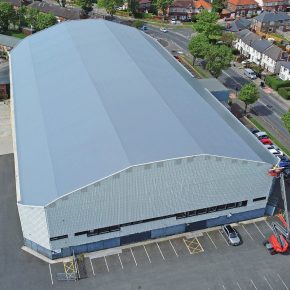
How to handle key areas in construction that have stringent legal processes
 GUEST BLOG
GUEST BLOG
Philip Graham, Director & Head of Construction at DJM Solicitors looks at some key areas within construction that have stringent legal processes including procurement, late payments and adjudications.
Legal processes within construction
The construction industry can be a challenging environment in which to operate. Complex projects can involve numerous parties with competing objectives, which can often result in miscommunication and disagreement. This can make disputes and legal procedures particularly complex and time intensive.
There are some key areas within construction that have stringent legal processes from the very outset of work to the end, which are worth understanding.
Procurement process
For public sector work there is a strict procurement process in place, designed to ensure suppliers have a fair opportunity to win work. Some private sector projects may also use a procurement process, although there is no obligation to do so.
The Government Construction Strategy was introduced in May 2011 to set out a better model for public sector procurement. It follows basic steps including that a client will issue a brief, with those parties participating in the delivery of the brief working together.
However, while a standard form of contract often forms the base of any agreement (and is a typical inclusion at tender stage) bespoke terms or amendments are common and need careful attention. Reliance on what you believe to be a standardised contract included to simplify terms can be a costly mistake. Treat each contract on its own merit. Tenders will often require acceptance of the included contract terms as a precondition and a review after submission of any bid could be too late.
Late payments
Late payments can impact the whole supply chain and often affect other projects by restricting cash flow. Specific legislation governs the mechanisms for payment in the form of the Housing Grants Construction & Regeneration Act 1996. Basically, the Act provides for a statutory framework for payments under relevant construction contracts.
At the outset of work, the contract should have already agreed what the Act defines as an adequate mechanism for payment, which it is important for both the payer and payee to follow correctly.
While the use of such legislation and your contract terms provides a method by which to pursue or defend claims for payment, opening a dialogue is always recommended first. Litigating is normally the last resort.
If the payment is late, statutory interest can accrue at a rate of 8 per cent plus the Bank of England base rate for business-to-business transactions. You can also claim debt recovery costs and compensation if appropriate.
If the issue isn’t rectified quickly, there are a variety of legal routes that can be explored, including mediation, court proceedings, arbitration and/or adjudication. Each has their own benefit and disadvantage although within construction contracts adjudication provides a particular method of dispute resolution.
Adjudication
Disagreements in the construction industry are common, and with complex contracts and multiple parties they can often escalate into serious disputes.
Late payments, delay, defects and the scope of works are the most common types of dispute, although often disputes will involve more than one issue. Companies may attempt mediation or look to court proceedings, but when these fail, or prove too expensive, parties have the option of adjudication.
Adjudication provides an interim solution that enables work to continue under the existing contract and allows disputes to be resolved more quickly and cost-effectively than through court proceedings or arbitration. Typically adjudication is decided within 30 days of the referral of any dispute, unless the parties agree a longer period.
The decision to start an adjudication must be taken carefully. There are often strong tactical or technical reasons for doing so, but it is not suitable for more complex disputes.
Adjudication is only a temporary determination, and parties retain the right to ask a Court or arbitrator to finally decide the dispute, which means any adjudication decision could be overturned. Adjudication is not perfect, and it’s not for everyone, but it can be a quick, cost-effective and useful mechanism of ensuring payment and maintaining cash flow through the supply chain.
Latest news

23rd April 2024
Geberit brings Parallel World to Clerkenwell Design Week
Visitors to this year’s Clerkenwell Design Week (21 – 23 May) can step into a parallel world and discover the benefits of cleaning with water, thanks to Geberit.
Posted in Articles, Bathrooms & Toilets, Bathrooms, Bedrooms & Washrooms, Building Industry Events, Building Industry News, Building Products & Structures, Building Services, Exhibitions and Conferences, Innovations & New Products, Interior Design & Construction, Interiors, Plumbing, Restoration & Refurbishment, Retrofit & Renovation
23rd April 2024
Mitsubishi Electric Ecodan Heat Pumps and Water Cylinders to be stocked by The Boiler Shop
Mitsubishi Electric’s full range of Ecodan heat pumps and hot water cylinders are to be stocked by one of the north-west’s best established independent merchants, The Boiler Shop.
Posted in Articles, Building Industry News, Building Products & Structures, Building Services, Facility Management & Building Services, Heating Systems, Controls and Management, Heating, Ventilation and Air Conditioning - HVAC, Plumbing, Posts, Retrofit & Renovation, Sustainability & Energy Efficiency
23rd April 2024
Trio of Senior products used in new Nottingham residential scheme
Solutions from Senior Architectural Systems have helped complete The Barnum – a new residential development on Nottingham’s Queen’s Road.
Posted in Aluminium Products, Articles, Building Industry News, Building Products & Structures, Building Systems, Case Studies, Curtain Walling, Doors, Glass, Glazing, Posts, Restoration & Refurbishment, Retrofit & Renovation, Walls, Windows
22nd April 2024
New EJOT role will develop strategic support for UK flat roofing sector
EJOT UK has taken a major step in the expansion of its support for the flat roofing market by appointing one of its most experienced building envelope fastening specialists as its first sector-dedicated business development manager.
Posted in Articles, Building Industry News, Building Products & Structures, Building Systems, Innovations & New Products, Posts, Recruitment, Restoration & Refurbishment, Retrofit & Renovation, Roofs
 Sign up:
Sign up: